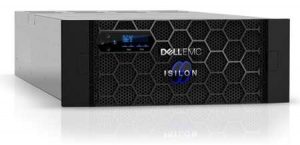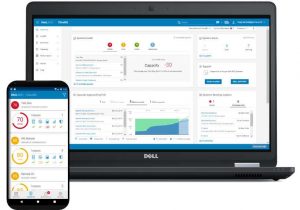Dell EMC Isilon Enhancements Embrace Cloud, Support Kubernetes and Reduce Storage Footprint
Able to empower organizations to take control of unstructured data and drive change
This is a Press Release edited by StorageNewsletter.com on January 29, 2020 at 2:23 pm From Erin K. Banks, director, product marketing, unstructured data solutions group, Dell EMC
From Erin K. Banks, director, product marketing, unstructured data solutions group, Dell EMC
What a month this has been for Dell EMC Isilon. Not only are we announcing some pretty powerful innovations, we also won a Technology & Engineering Emmy Award this month. Isilon and OneFS have made an impact on the M&E industry and we have been able to empower organizations to take control of their unstructured data and drive change.
According to Gartner, “By 2024 enterprises will triple their unstructured data stored as file or object storage from what they have in 2019.” (*)
As data continues to grow at this unrelenting pace, it is being processed in new ways and becoming more distributed across data centers and clouds.
When I think about this data growth, I always think about data being created and how it changes over time, resides in different places and its value ebbs and flows. Data has a lifecycle, but have you ever stopped to think about it? Have you followed the data from creation to actionable insights? For instance, imagine a world where a drone is flying over a field and taking videos. These videos are helping others analyze plant growth and soil nutrients. Data is created but it can’t stay on the drone, it needs to be stored and analyzed by many data users now and in the future. Or what about genome data? Think about its lifecycle and how so many people use it and get benefit out it over years and years. The data is constantly moving and constantly being accessed and analyzed. Data doesn’t get created and just sit somewhere, it has a life.
As we have entered this Data Decade, data is proving to become an organization’s most valuable asset, IT leaders need to take a Data First approach to ensure data is secured, protected, available where and when it is needed, delivered at the performance levels required by an organization’s applications, and stored and managed within compliance policies. Having the right tools that can detect problems and automatically provide insights about your data center will be increasingly beneficial to mitigating the risk of data unavailability – or even worse – data loss, thus providing an added layer of protection.
To help customers better navigate their multi-cloud journey, Dell Technologies today announced platform enhancements and new capabilities to Isilon and OneFS that provide the modern tools and agility organizations need to derive value and gain actionable insights from their file data and manage its massive growth.
These enhancements allow customers to:
-
Seamlessly extend the familiar, scale-out storage of Isilon OneFS to the cloud to easily and efficiently run compute-intensive file workloads in Microsoft Azure with Dell EMC Cloud Storage Services.
-
Use Dell EMC CloudIQ to monitor for potential vulnerabilities, pinpoint system anomalies and plan long-term with capacity forecasting, across their Dell EMC storage environment.
-
Deploy containerized (Kubernetes) workloads with Isilon through support for the Container Storage Interface (CSI) Plugin.
-
Reduce storage footprint and drive new workloads with Isilon OneFS 8.2.2, which delivers up to 3x greater effective capacity and support for 4x larger file sizes.
But for now, let’s provide some more detail into each of them and see what it means for unstructured data across industries, throughout its lifecycle.
Efficiently Run Compute-Intensive file workloads in Microsoft Azure
Dell EMC Cloud Storage Services connects external storage – consumed as a service – directly to the public cloud. This enables customers to combine the benefits of compute and processing services in the cloud with the unmatched scalability, performance and efficiency of Isilon, while maintaining control and security of their data. Cloud Storage Services with Microsoft Azure has been enhanced to deliver a higher bandwidth (up to 200Gb/s), lower latency connection (as low as 1.2ms) from Isilon to the Microsoft Azure cloud using Azure ExpressRoute Local. There are also no outbound data traffic costs for data written to Isilon from within Azure.
This solution is for industries, which often require on-demand computing power tied to a massive file system. It allows organizations to choose the right combination of compute and storage for demanding, high I/O throughput file-based workloads that require high compute performance on a periodic and/or unpredictable basis, suitable for a cloud consumption model. Eliminating egress charges enables workloads that require a lot of temporary writes to Isilon to cost-effectively take advantage of Azure’s application services.
“We are very excited to be a part of the Cloud Storage Services offering for Microsoft Azure and Isilon, a truly unique, Enterprise cloud solution that reduces the complexity and time required to replicate and present large, petabyte-scale datasets directly into Azure and eliminates the high cost of outbound egress fees typically associated when writing data to environments outside of the public cloud.” said Sean Charnock, CEO, Faction, Inc.
Remember that genome data we discussed earlier? What if you are in life sciences and want to be able to take advantage of cloud applications for genome analysis. Large research facilities processing hundreds of thousands of genomes per year generate petabytes of very large file data to be stored and also have a demand for computing power that is bursty by nature. With our latest Isilon cloud advancements, you can leverage native Isilon array-based replication to replicate this data to a trusted partner site and easily and cost-effectively leverage the powerful cloud services offered by Azure cloud as desired and watch the value of your data grow.
Unified insights and analytics for broader storage visibility
Click to enlarge
With CloudIQ support for Isilon customers gain user-friendly summaries of the health of their data center, streamlining administrative tasks and alleviating bottlenecks. CloudIQ, a free, cloud-based application, leverages machine learning to deliver insights, monitoring and analytics about your storage environment – empowering IT specialists to report, predict, and proactively address issues before they impact the business.
With support across Dell EMC’s portfolio including Isilon, PowerMax, Unity XT, XtremIO, SC Series, PowerVault and Connectrix switches, customers can now monitor their data center through CloudIQ’s single interface and can access it from anywhere via any web browser or the CloudIQ mobile app. With all of this data living on your storage growing in size and value, becoming increasingly distributed and being leveraged in new ways, it is imperative that you have the tools to ensure the health of your data and provide visibility across your environment. Now, you have even more control in your hands.
Enterprise storage features for containerized workloads
As containerized workloads continue to rapidly grow across hybrid clouds, software development and IT operations teams are looking for easier and more cost-effective ways to deploy Kubernetes. Dell is at the forefront of providing infrastructure solutions for customers to take this rather complex workload head-on. Isilon is now Kubernetes ready to provide customers the best scale out NAS features to containerized workloads with the Container Storage Interface (CSI) Plugin for Isilon.
With the CSI Plugin for Isilon, customers gain scalable persistent storage for containerized workloads with operations including volume provisioning/deletion, snapshot creation/deletion, creating volumes from snapshots and shared storage access for NFS file shares across multiple Pods. The CSI plugin is available free of charge on Dell EMC Community forums for CSI Drivers and Containers, GitHub and Docker Hub.
Let’s go back to those drone files, you store them on Isilon but you also want to analyze the images and videos and compare them to previous years. What good is data if developers can’t get their hands on it to create their next-gen applications. With the Container Storage Interface plugin, developers can build and deploy micros-ervices on a Kubernetes cluster with Isilon as the file storage platform.
Now don’t be surprised that the large drone file is stored on your favorite Isilon. We heard you want to store more and more large files, you want to get more value out of your data, no matter the size. We have made improvements to OneFS that give you greater capabilities.
Increased scalability for growing data demands
Making our distributed file systems storage platform even better, the latest release of OneFS 8.2.2 supports 16TB file sizes to drive new workloads that demand larger files, such as drone telemetry, automated driver assist solutions, oil and gas exploration and electronic design automation-based solutions. Inline compression and deduplication deliver up to 3x greater effective capacity on the high capacity, high performance H5600 platform enabling customers to reduce data center footprint and optimize storage services.
And while you are at it, take some time to get a clear understanding of your data. Where did it get created, where did it travel and how is it giving you the most value? Only then can you have a true Data First approach.
(*) Gartner, Inc.Magic Quadrant for Distributed File Systems and Object Storage by Julia Palmer, Raj Bala, Chandra Mukhyala, September 30, 2019.
Read also :
Dell Technologies World: Dell EMC Storage Innovations Designed for Data Era
Include Unity XT, PowerMax with Optane DC drives, Isilon, OneFS 8.2, Cloud Storage Services, and enhanced Isilon CloudPools software
May 10, 2019 | Press Release
Dell EMC Helps Enterprises Tame Growth of Unstructured Data With Isilon and ClarityNow
Scale-out NAS delivers performance and efficiency, software provides visibility, control and mobility of unstructured data in data center and cloud.
February 13, 2019 | Press Release















 Subscribe to our free daily newsletter
Subscribe to our free daily newsletter

